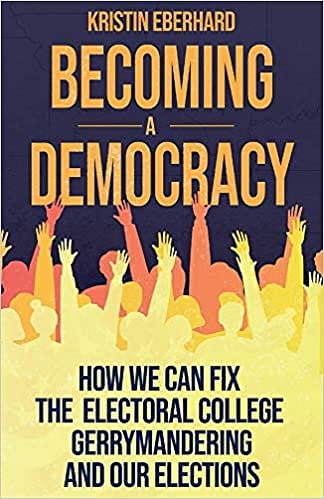
Whether you’re waiting to get you COVID vaccine or stuck inside on a rainy day, these inspiring titles are recommended reading for Democracy Nerds:
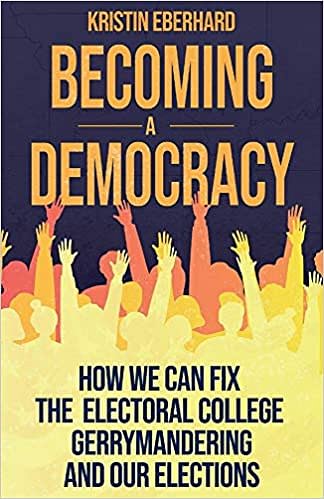 Becoming a Democracy: How We Can Fix the Electoral College, Gerrymandering, and Our Elections -- Sometimes it feels like a handbook is necessary to make democracy better in the United States. Luckily, this book perfectly fits that description. Written by Kristin Eberhard, Director of Climate and Democracy for the Sightline Institute, this book provides easy to read chapters and checklists for both novice and advanced democracy activists to pursue reforms in their states on a range of issues including automatic voter registration, restoring voting rights to ex-felons, and sortition (citizens selected at random to determine policy.) (Sightline Institute.)
Becoming a Democracy: How We Can Fix the Electoral College, Gerrymandering, and Our Elections -- Sometimes it feels like a handbook is necessary to make democracy better in the United States. Luckily, this book perfectly fits that description. Written by Kristin Eberhard, Director of Climate and Democracy for the Sightline Institute, this book provides easy to read chapters and checklists for both novice and advanced democracy activists to pursue reforms in their states on a range of issues including automatic voter registration, restoring voting rights to ex-felons, and sortition (citizens selected at random to determine policy.) (Sightline Institute.)
Click here to listen to how author Kristin Eberhard explain what steps she would take if she had the ability to perform a "Thanos snap" and reform democracy.
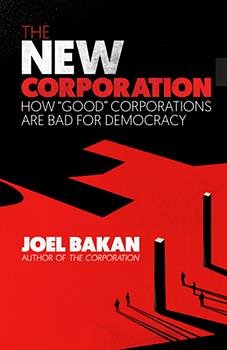 The New Corporation: How "Good" Corporations Are Bad For Democracy -- In 2004, author Joel Bakan published “The Corporation,” which inspired an award-winning documentary of the same name. In this book, Bakan offered a simple yet provocative premise: If corporations are actually people, they fit the psychological profile of a psychopath. Over 15 years later, Bakan provides a follow-up: “The New Corporation: How ‘Good’ Corporations Are Bad For Democracy,” in which he points out that despite their efforts to reform their image, corporations continue in their efforts to capture and undermine democracy. Bakan’s new book also inspired a documentary, “The New Corporation: The Unfortunately Necessary Sequel.” (Penguin Random House)
The New Corporation: How "Good" Corporations Are Bad For Democracy -- In 2004, author Joel Bakan published “The Corporation,” which inspired an award-winning documentary of the same name. In this book, Bakan offered a simple yet provocative premise: If corporations are actually people, they fit the psychological profile of a psychopath. Over 15 years later, Bakan provides a follow-up: “The New Corporation: How ‘Good’ Corporations Are Bad For Democracy,” in which he points out that despite their efforts to reform their image, corporations continue in their efforts to capture and undermine democracy. Bakan’s new book also inspired a documentary, “The New Corporation: The Unfortunately Necessary Sequel.” (Penguin Random House)
Click here to listen to author Joel Bakan discuss whether corporations should be trusted to solve the problems they helped create.
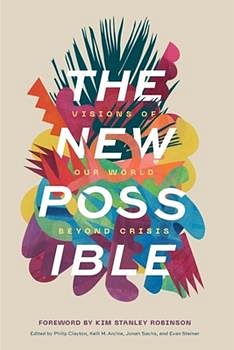 The New Possible: Visions of Our World Beyond Crisis -- One-plus year into the COVID pandemic, it’s hard to imagine that an end is in sight. But with ramped up distribution of vaccines occurring, the days beyond social distancing and “sheltering at home” may soon be on the horizon. A key question is: how should our lives be post-pandemic? This book, a collaboration between the Institute for Ecological Civilization and One Project, points out that the world is all ready in crisis before the pandemic, which COVID made clear. This book offers suggestions from a number of global leaders about why we may not necessarily want to return to “normal” if such a return includes the various crises exacerbated by COVID. (One Project)
The New Possible: Visions of Our World Beyond Crisis -- One-plus year into the COVID pandemic, it’s hard to imagine that an end is in sight. But with ramped up distribution of vaccines occurring, the days beyond social distancing and “sheltering at home” may soon be on the horizon. A key question is: how should our lives be post-pandemic? This book, a collaboration between the Institute for Ecological Civilization and One Project, points out that the world is all ready in crisis before the pandemic, which COVID made clear. This book offers suggestions from a number of global leaders about why we may not necessarily want to return to “normal” if such a return includes the various crises exacerbated by COVID. (One Project)
Click here to listen to Philip Clayton from the Institute for Ecological Civilization discuss how an "Us"-centered approach is necesary to imagine a new possible.
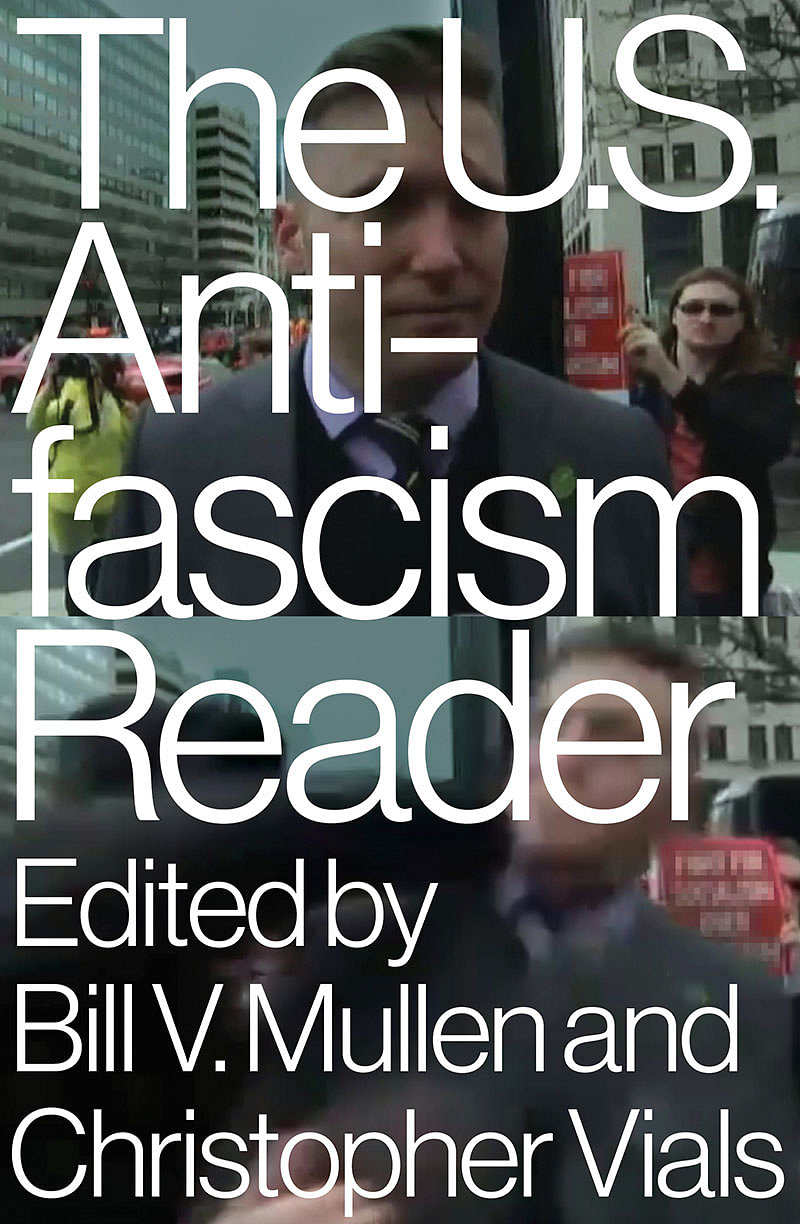 The U.S. Anti-Fascism Reader -- Although fascism rears its ugly head throughout American history, mobilized activists, workers, and movements have continually pushed back. This volume, compiled by co-editors Bill Mullen and Christopher Vials, focuses on U.S. post-war anti-fascism in the latter-half of the 20th century, and includes contributions from undercover journalist Avedis Derounian attending an “America First” meeting in 1941 Manahattan, civil rights activist Robert F. Williams, and an account of the Black Panthers’ United Front Against Fascism conference from 1969. Fascism will always be the diametric scourge against democracy, and readers will be inspired to build on the leaders of the anti-fascist movement from previous decades. (Verso Books)
The U.S. Anti-Fascism Reader -- Although fascism rears its ugly head throughout American history, mobilized activists, workers, and movements have continually pushed back. This volume, compiled by co-editors Bill Mullen and Christopher Vials, focuses on U.S. post-war anti-fascism in the latter-half of the 20th century, and includes contributions from undercover journalist Avedis Derounian attending an “America First” meeting in 1941 Manahattan, civil rights activist Robert F. Williams, and an account of the Black Panthers’ United Front Against Fascism conference from 1969. Fascism will always be the diametric scourge against democracy, and readers will be inspired to build on the leaders of the anti-fascist movement from previous decades. (Verso Books)
Click here to listen to Bill Mullen and Christopher Vials discuss why the term "anti-fascist" shouldn't be a dirty word.
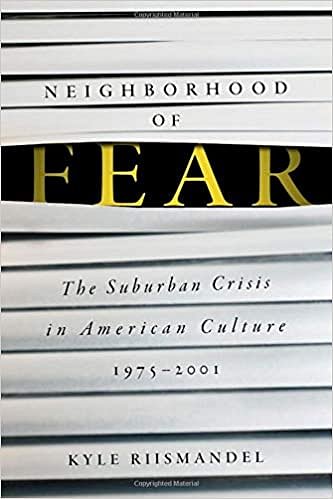 Neighborhood of Fear: The Crisis in American Culture, 1975-2001 -- Sometimes taking a look at recent history helps us understand our current moment. Kyle Riismandel, a professor at the New Jersey Institute of Technology / Rutgers-Newark, explores American suburbia in the final quarter-century of the 20th century. Riismandel’s study includes popular culture touchstones from the era--heavy-metal music & "Satanic panic", the kidnapping of Adam Walsh & "stranger danger"--to portray aggrieved American suburban home-owners feeling betrayed, isolated, and afraid. This led to the rise of “productive victimization”--in which society’s most privileged members leveraged their fears to wrangle concessions from elected officials. Primed by these fears, suburban American homeowners were primed and vulnerable to the rise of conservative outrage media and Fox News. As we witnessed this past Jan. 6th, the “productive victimization” that rose from America’s fear-fueled suburbs in the 1970s and 80s continue to plague us to this day. (Johns Hopkins University Press)
Neighborhood of Fear: The Crisis in American Culture, 1975-2001 -- Sometimes taking a look at recent history helps us understand our current moment. Kyle Riismandel, a professor at the New Jersey Institute of Technology / Rutgers-Newark, explores American suburbia in the final quarter-century of the 20th century. Riismandel’s study includes popular culture touchstones from the era--heavy-metal music & "Satanic panic", the kidnapping of Adam Walsh & "stranger danger"--to portray aggrieved American suburban home-owners feeling betrayed, isolated, and afraid. This led to the rise of “productive victimization”--in which society’s most privileged members leveraged their fears to wrangle concessions from elected officials. Primed by these fears, suburban American homeowners were primed and vulnerable to the rise of conservative outrage media and Fox News. As we witnessed this past Jan. 6th, the “productive victimization” that rose from America’s fear-fueled suburbs in the 1970s and 80s continue to plague us to this day. (Johns Hopkins University Press)
Click here to listen to author Kyle Riismandel discuss how the "neighborhoods of fear" in American suburbs led to the rise of "productive victimization."
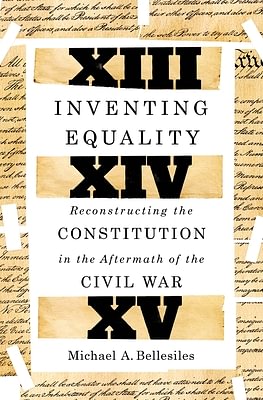 Inventing Equality: Reconstructing the Constitution in the Aftermath of the Civil War -- One of the unfortunate aspects of American history is that the promise of the U.S. Constitution has never been fully realized. Eventually, however, the inherent contradiction of including language offering rights and liberties to all but only offering these rights to a portion of the population would eventually come to a head in the Civil War. Historian Michael Bellesiles provides a well-researched portrayal of one of the key moments of American history in which the promise of the U.S. Constitution was expanded to an increased portion of the population. The eventual passage of the 13th, 14th, and 15th Amendments took important steps to expand Constitutional rights and liberties--yet still fell short to extending these rights to all Americans. (St. Martin's Press)
Inventing Equality: Reconstructing the Constitution in the Aftermath of the Civil War -- One of the unfortunate aspects of American history is that the promise of the U.S. Constitution has never been fully realized. Eventually, however, the inherent contradiction of including language offering rights and liberties to all but only offering these rights to a portion of the population would eventually come to a head in the Civil War. Historian Michael Bellesiles provides a well-researched portrayal of one of the key moments of American history in which the promise of the U.S. Constitution was expanded to an increased portion of the population. The eventual passage of the 13th, 14th, and 15th Amendments took important steps to expand Constitutional rights and liberties--yet still fell short to extending these rights to all Americans. (St. Martin's Press)
Click here to listen to author Michael Bellesiles describe the experience of white Union soldiers fighting alongside Black soldiers (who were often the very first Black people ever seen by Union soldiers.)
